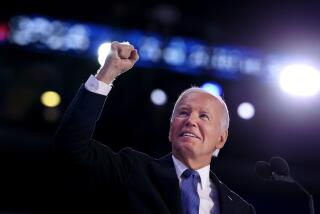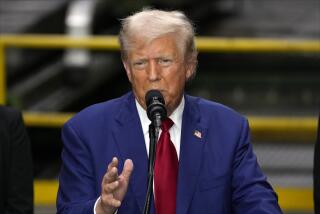Charges Vex Clinton and Brown in N.Y. : Campaign: Candidates are forced again to respond to allegations of dishonesty and hypocrisy. Voter turnout for primary is expected to be low.
- Share via
NEW YORK — This state’s Democratic primary campaign slid toward its final 24 hours Sunday with both candidates forced once more to defend themselves against charges of dishonesty and hypocrisy while seeming to tire of the battle’s snarling tone.
At morning appearances and then at a televised debate, Arkansas Gov. Bill Clinton faced renewed questioning about his draft status in the late 1960s after reports in The Times and the Associated Press disclosed that he had received an induction notice before entering an ROTC program in the summer of 1969.
Former California Gov. Edmund G. (Jerry) Brown Jr., meanwhile, faced queries about a Times study that showed a large percentage of people appointed to judgeships in the last years of his tenure had contributed money to his presidential and senatorial campaigns.
The two candidates spent the first few minutes of their debate harshly attacking each other over negative advertisements and Brown’s flat-tax proposal.
Then they abruptly shifted ground, agreeing on a host of issues and ending the debate with Clinton praising Brown’s now-famous 800 number and Brown complimenting his rival as a “very intelligent” opponent who is “hard to get the better of.”
Afterwards, both men flew to Washington to participate in a national abortion-rights demonstration before returning here for a final day and night of campaigning.
But despite the sudden outburst of good feeling, the two-week New York campaign has set new lows in bitter campaigning and voter disenchantment even by the standards of a political season dominated by negativism.
“Nobody’s happy. Everyone’s miserable,” said a senior Clinton campaign aide, adding that voter turnout could be as low as 800,000--only half the turnout in 1988. “It’s just awful,” the aide said.
The expected low turnout--plus the possibility that former candidate Paul E. Tsongas could win a sizable vote--has left the race here volatile and unpredictable. Both campaigns and outside analysts say that Clinton appears to hold a lead, but all agree that his margin is shaky.
Tsongas, a former senator from Massachusetts, suspended his campaign last month after losing to Clinton in Illinois and to both Clinton and Brown in Michigan. On Sunday, he said his campaign remains half a million dollars in debt.
But he has teased New York voters with the possibility that he might get back into the race. Local supporters have begun a small television advertising campaign, featuring actor E. G. Marshall reminding voters that Tsongas remains on the ballot, and the Tsongas effort has received support from some newspaper editorialists.
Interviewed on ABC-TV’s “This Week With David Brinkley,” Tsongas escalated his non-campaign, saying publicly for the first time that he might get back into the race if voting here goes the right way Tuesday. Wisconsin and Kansas also vote on Tuesday. Tsongas said he would announce a decision Wednesday.
“I think there are two issues,” he said. “One, how do I do? But more particularly, how does Bill Clinton do? And I think that will be determinative.” Aides have said Tsongas would get back into the race if he gets more than 15% of the vote here and if Clinton fails to win.
New York Gov. Mario M. Cuomo, appearing on NBC-TV’s “Meet the Press,” predicted that Tsongas would do “astoundingly well; he will get double digits at least.” Tsongas “will deteriorate the victory for whoever wins; he might even drag it under 50%,” Cuomo said.
Analysts differ on what impact Tsongas might have on the other two candidates. To the extent that Brown has prospered by being the anti-Clinton candidate, Tsongas could hurt Brown by siphoning away voters who wish to cast a protest ballot. On the other hand, Clinton has garnered support from people who dislike Brown, either for his proposals or for his close ties to the Rev. Jesse Jackson, and Tsongas could pick up some of those voters as well.
With the likely low turnout in mind, both Clinton and Brown arranged their schedules to reach out to key constituencies. Both spent Sunday morning courting black voters by visiting churches. Then, after returning from the abortion-rights march, both set out to court white ethnic Catholics.
But even as Clinton and Brown tried to focus their attention on those wavering voters, they faced renewed barrages of questions over their past conduct.
In Clinton’s case, the questions centered, once again, on the Vietnam-era draft. Saturday night, responding to questions from reporters, Clinton’s campaign released a statement conceding that he had received an induction notice from his draft board in the spring of 1969--several months before he arranged to enter an Arkansas ROTC program that provided him with a draft deferment. Clinton had never mentioned such a notice.
Clinton insisted that he had not meant to mislead voters about how he had escaped military service. “All I can tell you is, this was not any kind of deliberate attempt to not disclose something on my part,” he told reporters outside his New York hotel.
Because attention in the past had focused on what he did after he got out of the ROTC, not on what he did before signing up, Clinton said he had not mentioned the induction notice earlier.
“I would gladly have told you this if it had even occurred to me that this was relevant to the story,” Clinton said of his comments, which he made at a time when the steps he took during the summer and autumn in 1969 to avoid the draft came under national scrutiny. “I have never had anything to hide on this.”
Clinton media adviser Frank Greer sought to minimize the impact of the disclosure. “There is only one small group of Americans who sit around and calculate on this,” Greer said aboard Clinton’s campaign plane, “and that’s the press corps.”
And Clinton firmly rebuffed the suggestion that the episode cast doubt upon his honesty. He said such a judgment would be a “false characterization.”
A spokesman for President Bush, however, insisted the incident raised precisely those questions. “This guy’s bringing a whole new meaning to the expression ‘virtual certainty,’ ” said Torie Clarke, press secretary for Bush’s reelection campaign.
“I think he should try to give straight answers to straight questions,” she continued. “There seems to me a pattern here of what he says is not quite what he means.”
Brown, campaigning in Buffalo late Sunday, called Clinton’s response on the draft “incredible.”
“Every time you look into his record you find another discrepancy,” he said.
Earlier, in response to questions, Brown insisted that he had never traded campaign contributions for judgeships. The Times reported Sunday that roughly one-fifth of the judges Brown appointed in his final two years as governor had contributed money to his campaign, in some cases within days of their nomination. Although some of the appointees denied any connection between the contributions and the nominations, others said they had sent money in hopes of improving their chances.
“I appointed 850 judges,” Brown said when asked about the story on the CBS-TV program “Face the Nation.” He said that they were “the most diverse, qualified group of people” and that his choices were based on three criteria: the recommendation of the California Bar Assn.; ethnicity, gender and philosophical diversity, and community service.
“A lot of people like to give you money because they want to, obviously, make friends with you,” Brown conceded. But that, he said, merely demonstrates the point of his campaign--that the country is in the grip of a “corrupt political process.”
“It isn’t unusual that people who want something out of government contribute,” Brown said. “That is American politics, folks. If you think it’s any different, then you’re pretty naive.”
Brown also flatly denied a San Francisco Examiner story Sunday that he went to Hong Kong a few years ago to set up a low-wage manufacturing plant in China for a pharmaceutical company he represented. Brown said he actually was there to “secure equity capital for investment in California” for a Sacramento firm.
Both the draft and the judgeship stories came up during the debate, which took place at WNBC-TV. It was the fourth of five such forums the two men will have held here before the vote.
Brown and Clinton opened the debate by attacking each other over negative advertisements, with Brown accusing Clinton of “sleaze” and Clinton charging Brown with being “hypocritical.”
“Your poll ratings show that your credibility for honesty is low; mine was high. So you’re putting ads out to try to bring me down to your level,” Brown complained.
Clinton hit Brown once again over Brown’s flat-tax proposal, which Clinton contends would sharply reduce taxes for rich Americans while raising taxes on the poor and middle class.
Brown proposes to replace the entire federal tax system--including income, estate, corporate and Social Security taxes--with a 13% flat tax on income and a 13% value-added tax on manufactured goods. Only home mortgage interest, rent and charitable contributions would be deductible from the flat tax.
Clinton noted that Brown has begun airing an ad featuring Carroll O’Connor, the actor who played Archie Bunker on television’s “All in the Family,” then quipped: “Carroll O’Connor of Beverly Hills, Calif., is going to make a killing out of this tax; Archie Bunker of Queens, N.Y., is going to get the shaft.”
As the debate went on, however, both men began emphasizing points of agreement, saying that they both supported abortion rights, opposed the establishment of a separate Palestinian state in the Middle East, would like to see campaign finance reforms, would spend more on education than the Bush Administration has done and would like to see Bush attend the global environmental summit in Rio de Janeiro in June.
But for campaign strategists on both sides, the most important part of the debate was the chance to appeal to the remaining undecided voters.
Clinton seems to have cemented his support among Jewish voters--probably 25% to 30% of the likely turnout--in large part because of Brown’s close embrace of the Rev. Jesse Jackson, who has alienated the Jewish community with his support of Nation of Islam leader Louis Farrakhan, his embrace of PLO leader Yasser Arafat in 1979 and his reference in 1984 to New York as “Hymietown.”
The two seem to be splitting the support of black voters, who likely will make up another quarter of the voter pool.
That leaves white, ethnic Catholic voters--the other large voting segment in Democratic primaries--as the swing votes. As the campaign moves into its closing stage, both candidates have turned their attention to that group.
Brown appears to have an edge among his fellow Catholics, in part, because Catholic voters here and elsewhere have reacted more negatively than other voting groups to the questions raised about Clinton’s character and, in part, because white ethnic voters here historically have given little support to Southern politicians.
During the debate, Brown made a point of referring several times to his education in Catholic schools and seminaries and to his heritage as the son of “an Irish politician”--former California Gov. Edmund G. (Pat) Brown.
“I came up in an Irish political background, like the Kennedys,” Brown said during the debate, then praised his teachers, “the nuns, the Dominican nuns, they teach a morality, a strictness that I always want to live up to.” Brown’s campaign has also begun running an ad touting Brown’s work with Mother Teresa at her mission in Calcutta.
Clinton, for his part, has begun airing a new ad that seeks to entice voters by asking if they are looking for “a different kind of candidate.” The advertisement then shows an open book with quotations highlighting various proposals that Clinton has made. But Clinton’s name does not appear until the very end of the 30-second spot. The idea, Clinton aides say, is to try to get voters to focus on Clinton’s ideas, rather than on their many questions about his character and credibility.
Times staff writers George Skelton in New York and Robert C. Toth in Washington contributed to this story.
* RELATED STORY: A15
More to Read
Get the L.A. Times Politics newsletter
Deeply reported insights into legislation, politics and policy from Sacramento, Washington and beyond. In your inbox twice per week.
You may occasionally receive promotional content from the Los Angeles Times.











